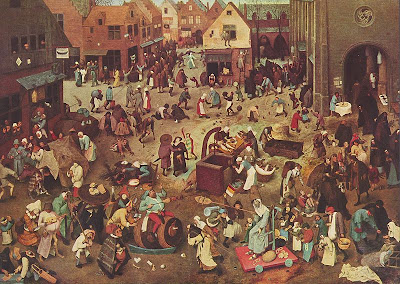 |
For instance, Lent.
Over the past few days I've been seeing status updates, tweets, and even group emails -- referring to Lent. I remember being in grade school and hearing references by my Catholic friends, to Lent, but never really paid much attention. Frankly, I was clueless.
I was over at one of my daughters the other night for a visit. She reminded me that my ward Relief Society Birthday Celebration is this week. (She attended my ward last Sunday -- I'm in Primary) I invited her to come. She turned me down. She said that instead she was attending a "girl's night out" with a few women in her apartment complex -- to discuss Lent. These young moms are a very diverse bunch of women. They live in UCSD married student housing. My daughter, who is LDS, has decided to participate in Lent. I was intrigued.
So, I Googled "Lent for dummies" and this is what I came up with:
What Is Lent and How Is It Observed?
On the Christian calendar, Lent is the 40-day period from Ash Wednesday to Easter. When it was first observed in the fourth century, its focus was on self-examination and self-denial in preparation for Easter, and Christians used fasting (abstaining from eating food) in the early years as a visible demonstration of this process.
Over the centuries, Catholics have relaxed some of the strict fasting rules. Today, only Ash Wednesday, Good Friday, and all Fridays during Lent are considered fasting days. On these days, Catholics over the age of 14 are to refrain from eating meat. (Historically, this practice was meant to help unify people who could afford meat with poor people who couldn’t.) In addition, on Ash Wednesday and Good Friday, those between the ages of 18 and 59 are to eat only one full meal and two smaller meals and aren’t to eat between meals.
Orthodox Christians are far more rigorous in their observance of fasting during Lent, believing that regular fasting is a crucially important discipline for one’s spiritual growth. Meat, dairy products, and eggs (which historically were considered more luxury foods than ordinary breads) aren’t allowed, with some additional restrictions on certain days. They can only eat fish (which was historically considered less of a luxury than red meat) on the feasts of the Annunciation and Palm Sunday.
In addition to refraining from eating, Lent is often a time when Christians give up something pleasurable (furthering the focus on self-denial), be it chocolate, meat or — shudder the thought! — coffee.
Some Protestant denominations (such as Anglican and Episcopalian) observe Lent, but many Protestant churches attach less significance to the Lenten season than to the individual holy days leading up to Easter.
I realize that this is a brief description of Lent, but as a member of the LDS Church, there are definitely aspect to this practice that I can relate to. For instance, Mormons are not strangers to the ritual of fasting. For those who may not be aware, Mormons fast on the first Sunday of every month; and when we have a personal desire to do so. We believe that through fasting we can gain strength both physically and spiritually. We consider fasting a righteous offering unto God, as we...
- Donate (a minimum) the cost of the two meals that we have abstained from to help the poor and the needy.
- Deny our physical appetite and turn to God, thereby receiving spiritual strength to endure and overcome life's many challenges.
- Believe that through fasting we are able to, with greater confidence, approach God in humble prayer for that which we stand in need.
As you can see, even with minimal understanding of Lent, members of the LDS Church have much in common with our Catholic friends. What I appreciate learning most -- is that all who love Jesus Christ, and recognize Him as our personal Savior, have a deep desire to express our love in similitude of His Great Sacrifice.
As Easter approaches and we prepare to celebrate the Resurrection of Jesus Christ -- we rejoice together in the knowledge that HE LIVES!
tDMg
Kathryn Skaggs
Pictures above: The Battle Between Carnival and Lent by Peter Brueghel
Continue reading at the original source →



